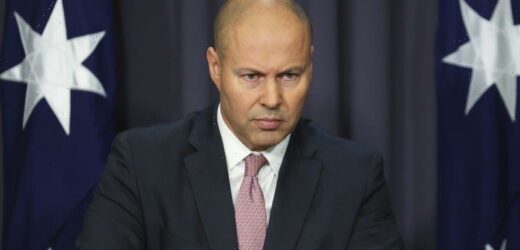Tax cuts to millions of Australians are likely to be extended for another year, government backbenchers believe, in a bid to keep voters onside ahead of the federal election as cost-of-living pressures bite.
The low- and middle-income tax offset delivers up to $1080 a year to more than 10 million Australians earning less than $126,000 a year in their tax refunds. If it is not extended at the March 29 federal budget, those Australians will face higher tax bills next year.
Treasurer Josh Frydenberg has previously said the tax offset is not permanent.Credit:Alex Ellinghausen
Queensland LNP senator Gerard Rennick said the tax cut should be made permanent, but he believed the federal election would be a factor in the government’s decision to scrap or extend it.
“I do think cost of living is an important issue and the silent voters will vote on that,” he said.
The cuts have cost the federal government roughly $8 billion a year and continuing the offset would add to the record level of government debt, which rose to $866 billion last week.
Prime Minister Scott Morrison said earlier this week “incredible” levels of government spending had pulled the country through the coronavirus pandemic, but it was important to wind back those measures when they were no longer needed.
“When it comes to the budget, you’ve got to get it back to more normal settings,” he told the AFR business summit on Tuesday.
Treasurer Josh Frydenberg said last month the offset was “not a permanent feature” of the income tax system as Labor signalled it would not push to extend it.
The low- and middle-income tax offset – known as the LMITO or “lamington” – was introduced by the federal government as a tax cut of up to $540 in 2018-19, then raised to its current level the next financial year. Mr Frydenberg said it was a stimulus measure when he extended the cut last year.
A backbencher who did not wish to speak on the record said some moderates within the Coalition would prefer to see the LMITO scrapped to help rein in government debt. However, they believed the election, due by late May, would force the government to extend it.
“With the election coming up, people might want to keep it,” the MP said.
Liberal backbencher Jason Falinski said people were feeling the pinch of higher petrol prices and, with growing inflation pressures, extending the offset would be sensible.
“COVID led to supply chain disruption which has seen inflation emerging for the first time in 40 years and the Ukraine war is also going to put pressure on prices,” he said. “Maintaining LMITO while people are feeling cost-of-living pressures is an open question for the Treasurer.”
Inflation has risen to 3.5 per cent while wages have grown by 2.3 per cent in the last year, according to recent Australian Bureau of Statistics data.
On Wednesday, Reserve Bank governor Philip Lowe said the rising cost of living would crimp spending in some areas.
The LMITO was introduced in stage one of the government’s income tax cut plan. Stage three, which will come into effect in 2024-25, will cut the number of income tax brackets to three, with a new marginal tax rate of 30 per cent for those earning between $45,001 and $200,000 replacing the 32.5 per cent and 37 per cent rates.
But until the stage three changes kick in, low- and middle-income earners will pay up to $1080 more each year in tax if the LMITO is scrapped.
The Morning Edition newsletter is our guide to the day’s most important and interesting stories, analysis and insights. Sign up here.
Most Viewed in Politics
From our partners
Source: Read Full Article


